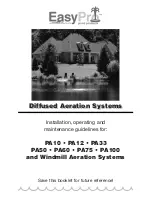
Page 7
Wire Specs and Run Distances
Wire Specs and Run Distances
Use this chart to pull wires in preparation of your installation:
Power Wire Specs and Run Distances
Description of Wire Run
Grounding
the Chassis
Residence and Telco
Phone Lines
Door Strike
Magnetic Lock
Dry Contact Closure (Most
Gate Operators
)
Exit Request
(REX) /
Auxiliary Open
Devices
AutoCall
Door Status Sensor
Barium Ferrite and
Wiegand Readers
Proximity Readers
Radio Frequency Module (RF)
Postal Lock
CCTV Camera
(Optional)
Wire Specification
12
AWG Copper
2 Twisted Pairs
18-24
AWG Shielded
2-Conductor
18-22
AWG Shielded
2-Conductor
18-22
AWG Shielded
2-Conductor
18-24
AWG Shielded
2-Conductor
18-24
AWG Shielded
2-Conductor
18-24
AWG Shielded
2-Conductor
18-24
AWG Shielded
5-Conductor
18-24
AWG Shielded
5-Conductor
22
AWG Shielded
RG-6 Coaxial
75 ohm
2-Conductor
18-24
AWG Shielded
Single Conductor
RG-59u Coaxial
Maximum Distance
12 feet
5000 feet*
500 feet
500 feet
100 feet
1000 feet
(Monitor with a .25 volt
p-p composite signal
sensitivity)
Page
8
9-14
15
15
16
16
17
17
18
18
18
19
19
NOTE: Use metal conduit
- run wires in metal conduit instead of PVC pipe. Wires run in PVC conduit may
experience interference. Metal conduits also add extra protection against lightning strikes.
Never
run
Telco Wires
and
High Voltage wires
in the
same
conduit. The high voltage may interfere with the Telco
Wires, possibly causing the system to malfunction.
* Total distance from Telco to residence regardless of number of units in chain.
Distance
Under 30 Feet
30 - 75 Feet
75 - 250 Feet
12 VAC Power (Included)
2-Conductor Shielded
14
AWG
14
AWG
14
AWG
12 VDC Power (Not Provided)
2-Conductor Shielded
14
AWG
14
AWG
N/A
Always
provide power from a dedicated source. Plug provided transformer into an outlet wired to its own 10 AMP
minimum circuit breaker. This will prevent two problems:
• Other equipment cannot introduce spikes, noise, surges or dips into the power circuit that will affect the system.
• The system’s operation will not be affected if any other equipment develops a short circuit across the power line.
CAUTION:
Not responsible for conflicts between the information listed in the above table and the requirements of
your local building codes. The information is for suggested use only. Check your local codes before installation.









































